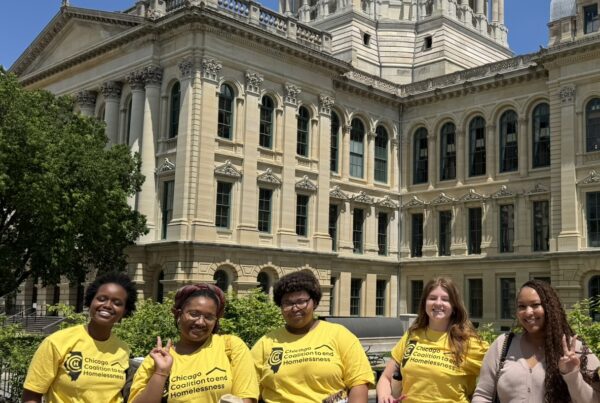By Sam Carlson, Manager of Research and Outreach
On Monday, Housing Policy Debate published CCH research on quantifying doubled-up homelessness, adding credibility to the years-long Homelessness Data Project research on measures of homelessness.
Many definitions of homelessness include “people temporarily staying with others”—doubling-up because of economic hardship or housing loss. Temporarily staying with others can have negative consequences that should be addressed, but the U.S. Department of Housing and Urban Development’s methods for enumerating homelessness exclude these arrangements, and Department of Education counts of doubling-up include only school children.
To better reflect all forms of homelessness one might experience, researchers at Chicago Coalition for the Homeless (CCH), Vanderbilt University, and the Heartland Alliance Social IMPACT Research Center developed a model to better estimate the total scope of people experiencing homelessness, incorporating people experiencing homelessness by temporarily staying with others.
This new model defines doubled-up homelessness as low-income individuals and families in low-income households when they fall outside of the conventional household composition and cannot afford to live in housing of their own or formally contribute to housing costs. For example, an adult child of the household head may be considered doubled-up if they have children of their own and live in an overcrowded home (more than two people per bedroom) with their parents.
Using this method, we find that 3.7 million people in the U.S. population were doubled up in 2019 and show significant differences in doubling up by geography, race and ethnicity, marital status, educational attainment, school enrollment, and employment status.
Notably, rates of Hispanic/Latinx doubled-up homelessness were high, in contrast to their rates of literal homelessness, and some rural areas with low rates of sheltered and unsheltered homelessness had high rates of doubling up.
National research was led by Molly Richard from the Community Research and Action program at Vanderbilt University. Molly was the 2021 recipient of the CCH Les Brown Award for Excellence in Public Policy for her partnership in this research.
Findings suggest that policies addressing homelessness and housing insecurity consider those experiencing doubled-up homelessness and that the current measure can assist in those efforts.
Interested in supporting this research or completing a doubled-up estimate for your community?
Contact us.








